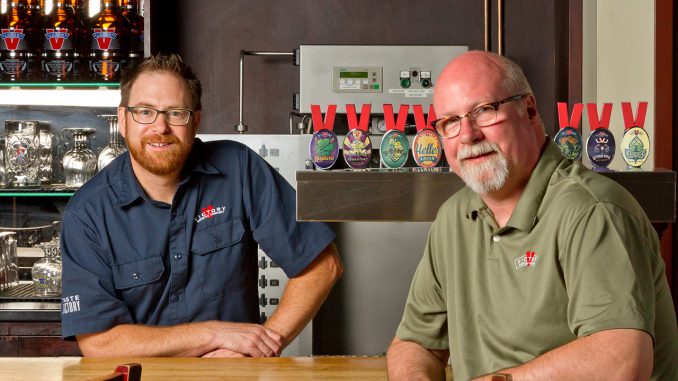
In 1985, Bill Covaleski gave his childhood friend, Ron Barchet, a home-brewing set for Christmas.
Covaleski, a 1985 graphic design alumnus, had already been brewing beer as a hobby, and the set piqued Barchet’s interest in brewing.
The two then took apprenticeships with German-trained brewmaster Theo DeGroen in Baltimore, Maryland.
Now, they run Victory Brewing Company, which has taphouses in Downingtown, Kennett Square, and Parkesburg, Pennsylvania. They recently debuted a special brew, the Cherry and White Ale, at the Tyler School of Art and Architecture’s Craft and Draft night on Oct. 11 and at Temple football’s homecoming game on Oct. 12.
The Cherry and White ale is a Belgium-style white ale with cherry, which was “thrilling” to make, Covaleski said.
“It’s a limited batch, and we’re hoping for it to get some love from the alumni and if we get a good response, maybe it’s something we continue,” he added.
Victory imagined the recipe idea and discussed the possibility of making it with Michael McCloskey, an associate risk, insurance and healthcare management professor at Fox School of Business, for two years, Covaleski said. McCloskey introduced him to Temple’s Office of Alumni Relations, which coordinated the creation of the ale, and the recipe was then approved by Temple’s Alumni Association, he added.
Senior graphic design students helped create the packaging for the ale, which features a stained-glass style red owl, Covaleski said, adding that it was great to see support from the students, professors and alumni.
The brewing company is planning to open a new taphouse in Logan Square in 2020 on the Benjamin Franklin Parkway, Covaleski said.
“We’ve always wanted to have a physical presence of brewing in the city,” Barchet said. “It wasn’t until the last few years that we really put it in a higher priority of our business plan to develop the right space in Philadelphia, and finding the right place took a while.”
Eva Golden, a junior music education major, said she would like to go to the brewery in Philadelphia when it opens and be able to see the process of their beer making.
She enjoys Victory Brewing because of its variety and quality, especially in how they “pull off,” sour beers with their Sour Monkey beer, she added.
“For a brewery that makes beer that is affordable and a lot of people drink, they don’t really skimp out on any of the stuff,” Golden said. “It’d be really cool to see how they go about keeping the flavors of everything they have as intense as it is without, you know, having crazy prices on their beers.”
Covaleski said that when their company was starting, they wanted to name it “Independence,” but after getting a cease-and-desist letter from another startup who had claimed the name, the two joked that it would be a “victory” if they could ever pull off the brewery.
“[Victory] was about, ‘Life is going to hand you regrets at some point, and you shouldn’t necessarily accept them too soon,’” Covaleski said. “We forged on as ‘Victory’ and that became somewhat of a rallying cry.”
Victory’s first taphouse in Downingtown was previously a Pepperidge Farm factory, a bakery that had been abandoned for eight years, Covaleski said.
The construction was a family effort, he added, and they were able to open in February 1996.
“[My dad] and I built the wood-burning pizza ovens by hand that fed the restaurant portion of the business, my wife … is a software engineer so she designed our fermentation temperature control program,” Covaleski said. “Then Ron’s dad, who had electrical experience did the wiring for equipment and stuff.”
Covaleski’s favorite part of brewing used to be creating recipes and seeing how different flavors come together, but he said, now it’s watching people enjoy the beer he creates.
“[Beer] creates a memory, an experience for people and that’s the real value,” he added. “It slows people down to have a thoughtful conversation with one another. It allows multiple generations to come together. So it’s really about the enjoyment of the beer, other people’s enjoyment of the beer.”
CORRECTION: A previous version of this story incorrectly listed the name of the professor who helped the brewing company with the Cherry and White ale recipe. The professor is Michael McCloskey.


Be the first to comment